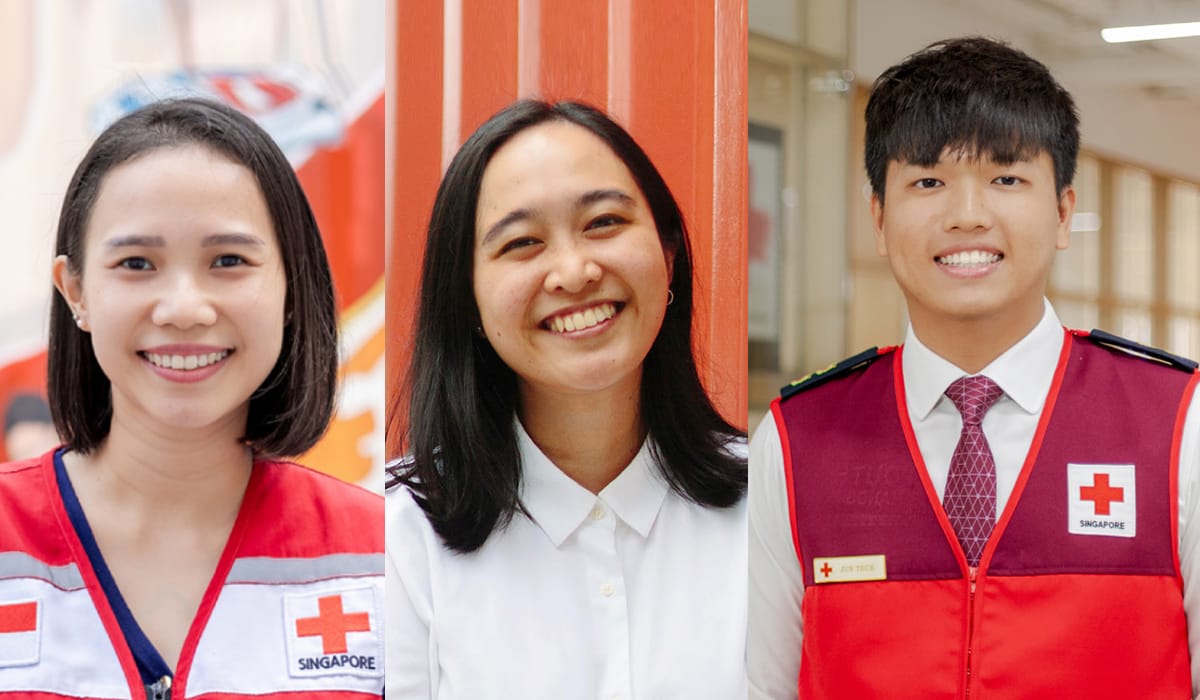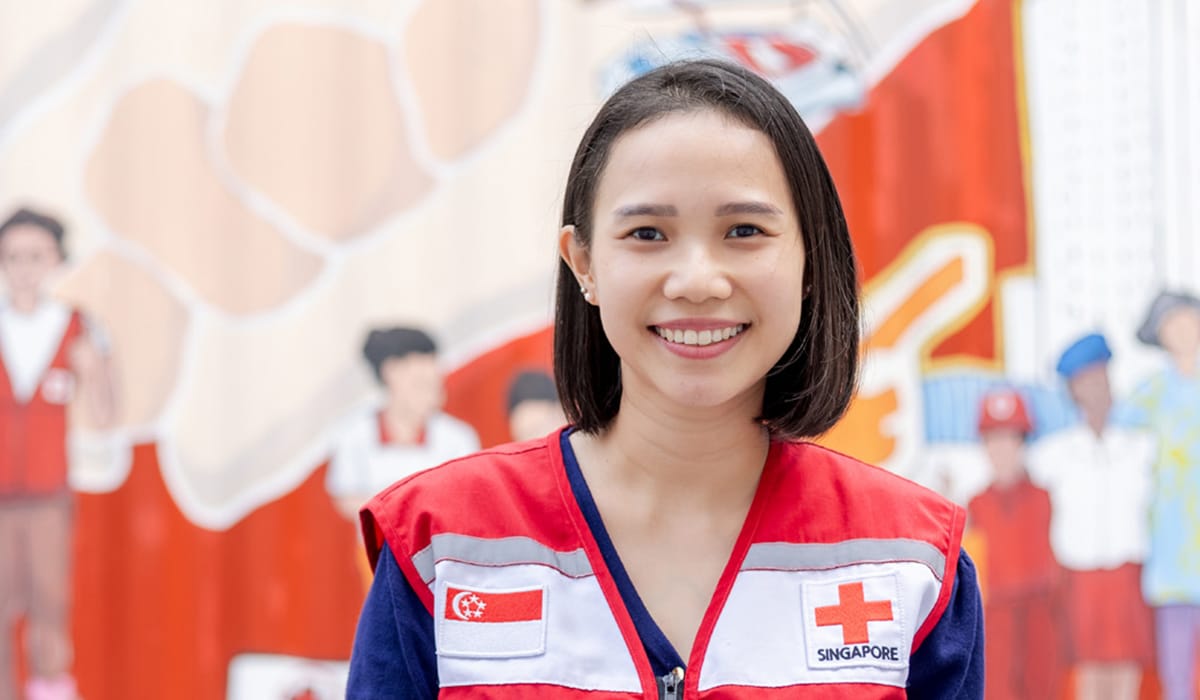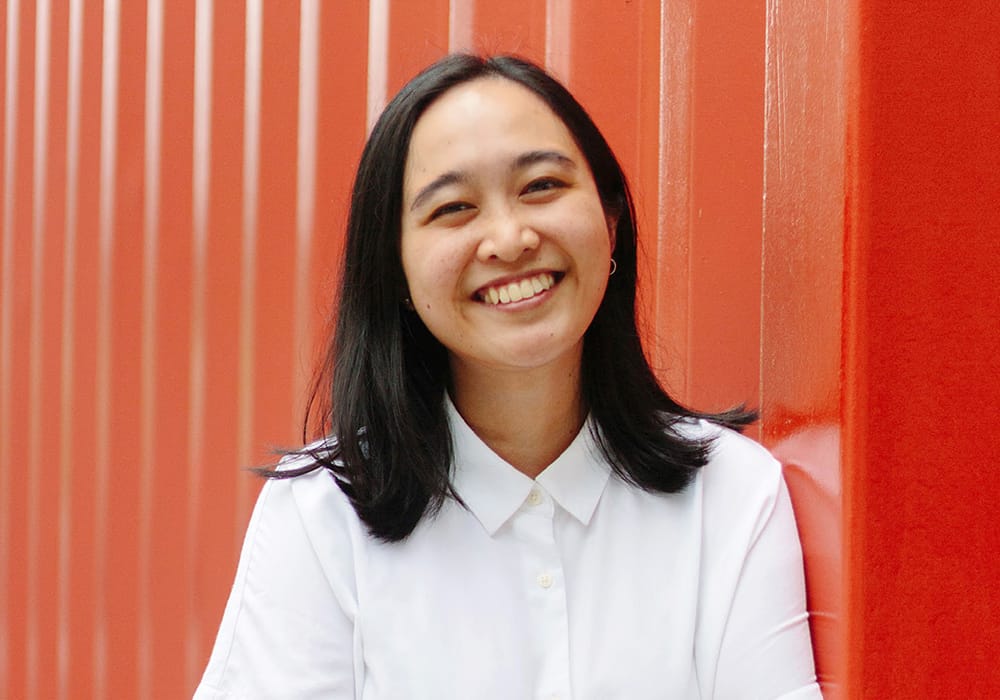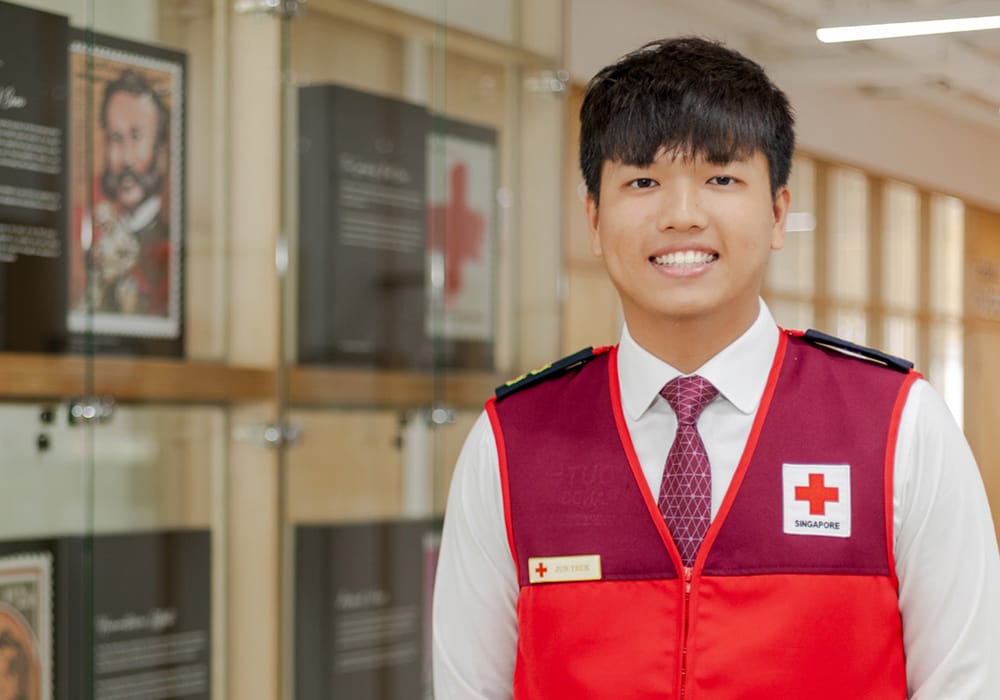
The humanitarian sector is a very dynamic field that demands an open heart and an open mind to keep on learning to serve meaningfully. Karine Tan, Fauzia Amalia and Quek Jun Teck play pivotal roles within the Singapore Red Cross (SRC), each contributing effectively to the organisation’s mission.
As a homegrown humanitarian organisation, the Singapore Red Cross (SRC) has been dedicated to relieving human suffering, protecting lives and dignity, and responding to emergencies since 1949. The SRC builds capacity and resilience through its training academy, and volunteer and youth development. Beyond Singapore, the organisation mobilises and translates contributions from the donor community to relief and recovery, rehabilitation and reconstruction efforts, with the aim of helping communities affected by disasters.
The success of the SRC is driven by a team of dedicated individuals including Karine Tan, Fauzia Amalia and Quek Jun Teck.
Karine, an Associate Director in the Community Engagement Division, oversees a range of local humanitarian programmes serving children, seniors, persons with disabilities, migrant workers and the broader community.
As an Assistant Head of the International Services department within the Global Engagement Division, Fauzia oversees SRC’s international disaster and crisis response, and capacity building efforts. Part of her responsibility is ensuring her team adheres to the proper processes and procedures while also maintaining donor accountability.
Jun Teck, an Executive at the SRC, manages the Uniformed Group in the Red Cross Youth (RCY), which largely consists of primary and secondary schools. A significant part of his responsibilities pertains to volunteer management, which involves taking care of welfare, development, and personal growth, as they represent the core of SRC’s main stakeholders.
We recently caught up with them to explore their roles and the impact of their contributions to the SRC.

Karine Tan is the Associate Director of the Community Engagement at the Singapore Red Cross. She oversees local humanitarian programmes serving children, seniors, persons with disabilities, and migrant workers.
Your work at SRC sounds fascinating! What made you pursue this as a career?
Karine: I have been with SRC for a couple of years and was seeking to advance my career with new challenges. An opportunity arose to transfer from the Resource Development to Community Engagement division.
Each position I’ve held presented its own unique set of challenges. Navigating these experiences has shaped my perspective and equipped me to better guide my team effectively and advocate for their needs.
Fauzia: I had a wonderful experience while interning with the SRC. During my six-month internship, I was exposed to opportunities which I would not have had in other organisations. I was also given a level of trust and responsibility that made me feel like a valued member of the team and not just an intern.
One month into my internship, I was deployed to Lombok, Indonesia, for the Last-Mile Support programme for migrant domestic workers. It is a programme by the SRC together with our local partners in Singapore to support injured or distressed migrant workers, who may need additional assistance in their journey home to reunite with their families. Looking back, I accomplished quite a lot during my internship.
Jun Teck: What inspires me is the appreciation and feedback I receive from the volunteers and students I work with. Realising that my efforts genuinely make a difference is incredibly motivating.
Seeing the dedication of the youth, who spend their time and effort to volunteer and contribute, reminds me of the passion that drives this work. Their enthusiasm constantly reinforces my commitment and motivates me to continue making a positive impact.

Fauzia Amalia is the Assistant Head for the International Services department under the Global Engagement Division at the Singapore Red Cross. She oversees global crisis response and capacity development efforts, including disaster relief projects and staff training, ensures adherence to processes and maintains donor accountability.
That’s inspiring! Do you have any memorable experiences you’d like to share?
Karine: A beneficiary once insisted on speaking to me and I was prepared for a negative feedback session. Instead, she wanted to personally thank me for the good work that my team had done. That came as a pleasant surprise to me.
Fauzia: I was given the opportunity to initiate the Centre of Excellence for Pandemic Preparedness a few months before COVID-19 happened. The centre aims to identify gaps and challenges in responding to a pandemic and provide a platform for the International Red Cross and Red Crescent Movement to work together in building pandemic preparedness and resilience in our organisations and the communities.
Many of the centre’s initiatives and activities are now based on our experience during the pandemic, underscoring the need to be prepared for future challenges ahead and applying the lessons learned. Looking back, it was a really timely initiative to start, and I hope the centre will continue to benefit the International Federation of Red Cross and Red Crescent Societies and also local communities in the years to come.
Jun Teck: A memorable experience for me was taking students on overseas humanitarian programmes and to the National Day Parade. Reading their reflections afterward made me realise how much these trips and events help them grow individually and learn valuable skills that aren’t often taught in school.
When students recognise, appreciate, and grow from these experiences, it highlights the positive impact we have on them.

Quek Jun Teck is an Executive at the Singapore Red Cross’s Youth Development. His responsibilities include managing the coordination with schools, overseeing development, mentorship, and progression for the primary and secondary students.
What have you learned from working at SRC?
Karine: The importance of a good mentor and having strong leadership qualities. It has also taught me resilience, patience and empathy.
Fauzia: I’ve learned that with all of our stakeholders, we have to listen to them to understand where they are coming from, examine our own needs and work together to reach a common goal. They come from all walks of lives, from different cultural backgrounds to different generations.
When it comes to our partners on the ground, their working culture can be very different from Singapore and we have to be understanding and adapt to their way of working or communicating.
Jun Teck: The most significant skill I’ve gained while working here is my interpersonal skills. Collaborating and communicating with volunteers of various age groups and our stakeholders has allowed me to grow immensely in this area.
Any advice for readers who are interested in following a similar path?
Karine: Keep an open mind, embrace challenges and be willing to learn from everyone, be it peers, volunteers or beneficiaries.
Fauzia: The humanitarian sector is a very broad and very dynamic field, so keep an open heart and an open mind to learning. Ask questions about the world we live in and find a cause that you believe in. Then go forth and take action!
Jun Teck: If you have the passion and patience to work with youth, this job can be incredibly meaningful and enjoyable. Interacting with them allows you to mentor and guide, while also learning a great deal from their perspectives and experiences.
Visit our Careers page for more career opportunities.
Original article published by BrightMinds. Reproduced with permission.

